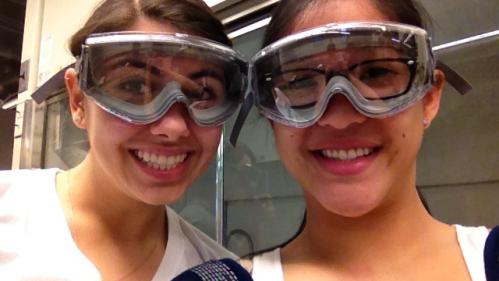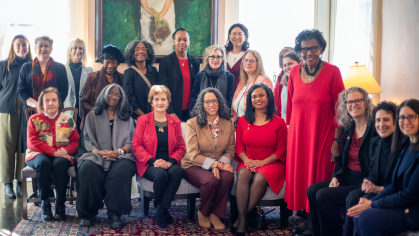from the Center for Energy Workforce Development Newsletter
When Katie Lau was accepted into Rutgers School of Engineering, she was excited but also a little bit anxious. She was excited because of her passion for biomedical engineering and the program that Rutgers, situated smack in the pharmaceutical hub of the nation, had to offer. But she’d be moving 2,000 miles away from her home in Las Vegas to enter a male-dominated environment. That was nerve-wracking.
So when she received her freshman housing application and was asked to click on a link for women in engineering, she was intrigued. One click later and she found herself applying for a special new program that would make all the difference in the world to her.
Lau was one of 20 women to enter the inaugural Reilly-Douglass Engineering Living Learning Community (Reilly-DELLC) program, a partnership between the School of Engineering and Douglass Residential College for women at Rutgers University. The program was created to help increase enrollment and retention of women engineering students, said Lisa Gleason, Stakeholder Engagement Specialist, Public Service Enterprise Group (PSEG), which draws from the program for interns and potential job applicants.
As Lau quickly discovered, Reilly-DELLC’s strategy was to provide academic, professional, social, and mentoring networks that support the students throughout their undergraduate engineering programs of study. It achieved that, said Lau, and then some. “They provided me with a family away from my own family. We were 20 girls all in the same classes, all going to the same places. We really bonded within the first month of school.”
Tiffany Kingsley, who grew up in New Jersey, wasn’t worried about being far from home. Nonetheless, she was drawn to the program when she learned about it during an Admitted Student Open House. She wanted female support as she entered a male-dominated field, and hoped that she’d find it there. She did.
“Coming into a new school and being put with other women in the same situation who are there to support you and help you was a really good selling point,” she said. “I think if it hadn’t been for this program, I don’t know that I would have made it through Rutgers, or at least not as successfully as I did.”
Kingsley said living with other women in the same program of study meant she had someone to sit with in class and draw support from when there was material she didn’t understand. “Sometimes people are afraid to speak up and ask questions in class,” she said. “Being able to talk to the other girls freely, knowing you wouldn’t be judged and they were able to help you, made a big difference.”
It gave her confidence, said Kingsley. And made her feel she was not alone.
The program, now in its fifth year, takes 32 female freshmen engineering students each year. In addition to living together, they are given a first-year exploratory course that exposes them to disciplines in engineering, employability skills workshops, field trips, and mentoring experiences. In the third and fourth years of the program, the students become mentors to the first-year students.
So far, it seems to be doing exactly what it set out to do: retaining female engineering students. Since its launch in 2012, the program has accepted 106 students with a 93.4 percent retention rate. Ninety percent of students in the first cohort graduated within four years with a cumulative GPA of 3.05. Two students have participated in PSEG’s internship program.
Nicole Wodzinski, Director of the Reilly-DELLC, said 18 women from the program’s first cohort graduated last year and can now be found in STEM industries and MS or Ph.D. programs around the country. Twelve are in industry positions, while six are in graduate programs. They are working at companies such as Bechtel, Corning, and Nestle. One is a process engineer at Procter & Gamble.
Kingsley is one of the two students who interned at PSEG. She connected with the company through the Women Investing in and Guiding Students (WINGS) program, a college-to-career mentoring program on campus, which is supported by the PSEG Foundation. When she requested a female mentor, preferably with a background in engineering, she was given two from PSEG. Through her mentors, she learned about the company’s summer internship program and was accepted.
Kingsley was paired with another female intern in PSEG’s Delivery Projects and Construction division, where they tackled a project for tracking man-hours for each division. They were also given an overview of company logistics, such as the environmental impacts of substations and transmission lines, the importance of safety, and the intricacies of utility-town relationships. “I really got to learn about how the utility works during that summer experience,” she said.
She was also allowed to attend meetings with supervisors and PSEG leadership. She enjoyed the experience so much that when it was time for her internship to end, she asked if she could extend it throughout the next academic year. “I ended up staying until I graduated,” she said.
Kingsley was able to shadow a woman who handled coordinating power outages and learned an enormous amount about the different company divisions as a result. After graduation, she was offered a job with the company, but ultimately chose to accept one at the Norfolk Naval Shipyard in the Nuclear Engineering and Planning department. She left the area for personal reasons, said Kingsley, but would love to work for PSEG should she ever return.
Kingsley credits the Reilly-DELLC program with much of her success, as does Lau, who is currently at UC Berkeley earning her master’s degree in bioengineering. “I feel like I would have stayed in engineering—that was my life’s passion—but I don’t think I would have stayed at Rutgers if I hadn’t been in this program,” said Lau. “I feel like I would have gotten too homesick without that support.”
Kinglsey said just seeing so many women working and achieving in a male-dominated field made her persevere. “You think, ‘Hey, they made it and I can do it, too.’ When you see these other women, you know you’re not alone. You are actually smart. You can do it. And you’re not going to fail.”



